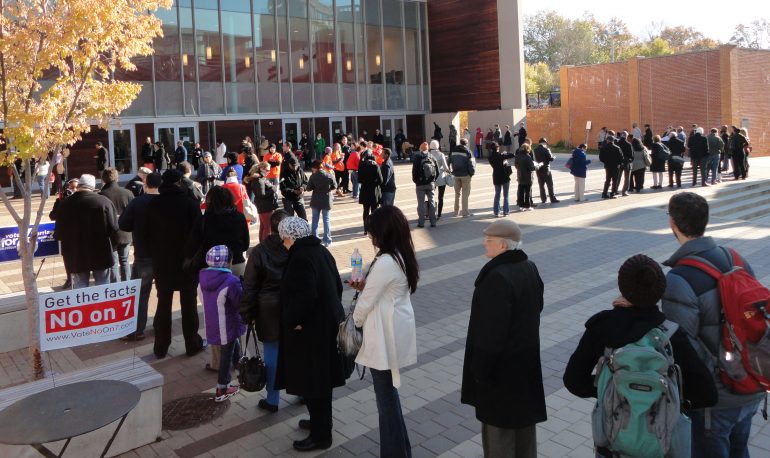COLLEGE PARK – In a state sure to go to President Barack Obama, with very few competitive congressional races, voters streamed to the polls in Maryland on Tuesday motivated by three high profile referendums on gay marriage, gambling and immigration.
With $92.2 million spent by supporters and opponents of Question 7, which would expand casino gambling in Maryland, the issue has dominated the airwaves in the state.
But the massive amount of campaign ads did not clarify the issue for all voters.
“I’m not too sure about whether the money will actually go to the schools,” said Mary Floyd, 58, who, despite her uncertainty, voted yes on Question 7 at Nicholas Orem Middle School in Hyattsville. “My thing is the jobs it will provide.”
Davon Sanders, 21, who also voted at Nicholas Orem Middle School in Hyattsville, said he supported Question 7 for a different reason.
“I think it would help bring in revenue,” Sanders said. “New York people drive hours to go to Jersey to go to casinos, so applying that down here could help keep money here.”

Capital News Service photo by Chris Leyden
Approval of Question 7 would clear the way for the construction of a casino at National Harbor in Prince George’s County and would legalize table games at Maryland’s five existing casinos. Increased tax revenues from expanded gambling would go to an education trust fund, but opponents have said education spending would not increase.
“They always put education at the front, that’s the carrot,” said Michael Bobian, 43, after voting at Glenn Dale Fire House. “But you never really get it.”
Talisa McMullen, 38, also voted in Glenn Dale. She said she viewed the revenue gained from casinos as a regressive tax.
“I just don’t believe that our school system should be dependent upon middle class and low income spending their money — wasting their money, actually — on false hopes and dreams,” McMullen said.
Gov. Martin O’Malley has been a high profile supporter of Question 7. O’Malley visited Kettering Baptist Church, a polling place in Upper Marlboro on Tuesday morning, to greet voters and make one last pitch for expanded gambling.
“The difference between passing Question 7 and rejecting Question 7 is the difference of roughly another $350 million annually into education or into West Virginia,” O’Malley said. “That’s really the choice.”
Expansion of gambling was approved with 52 percent of the vote.
At Stamp Student Union on the campus of the University of Maryland, College Park, the line to vote stretched more than 100 people long in early afternoon. The vast majority of those in line were students, and most were first time voters.
Exit interviews showed an overwhelming number of students voting for marriage equality.
“Everyone should be able to love whoever they want,” said student Lorena Diaz, 19. “To be able to get married and be respected under the law is very important.”
Same-sex marriage was legalized by the Maryland legislature in February, but it has yet to be enacted. Question 6 would either affirm or throw out the gay marriage law passed by the legislature. If Question 6 passes, gay couples would be able to get married on Jan. 1.
Student John Gillick, 19, was largely motivated to vote by Question 6. He thought gay marriage should be a given and not subject to referendum. “We shouldn’t even be able to vote on it,” Gillick said.
In Hampstead, David Pollard had a sardonic take on Question 6.
“I figure everybody has a right to be married,” Pollard said. “Actually, I think everyone has a right to be miserably married. I figured gay people have the same right to be miserable as the straight people do.”
Voting at Eleanor Roosevelt High School in Greenbelt, Beverly Howard, 64, disagreed. “My issue is the condoning of the marriage,” Howard said. “I think there is sufficient opportunity for gay partners.”
Same-sex marriage was approved by Maryland voters with 52 percent of the vote.
The DREAM Act, Question 4 on the Maryland ballot, would grant in-state tuition rates to some children of illegal immigrants. The DREAM Act was approved by Maryland voters with 58 percent of the vote.
It was, not surprisingly, a motivating issue for college students.
Voting at Stamp Student Union, Alex Cottman-Robinson, 18, voted “yes” on the DREAM Act, because “education should be available to everyone.”
In Hampstead, Valarie McNeese, 58, voted against the DREAM Act. “They are illegal aliens, I’m not going to subsidize it,” McNeese said.
In Hyattsville, Fanny Barreintois, 65, voted across party lines to cast a “yes” vote for the DREAM Act. Barreintois voted for all Republicans because she said she thinks they’re better for the elderly and Medicare, but she sided with Democrats on the DREAM Act.
“Education is the future of our country,” Barreintois said. “Without education we’ll become like Spain, kaput.”
While the presidential election has dominated the national conversation, there is little suspense in Maryland. The state is sure to vote for President Obama.
Many Obama supporters were in a joking mood.
“I don’t make enough money to vote for Mitt Romney,” said Mike Bost, 40, of Glenn Dale.
Peter Calich, 51, voted for Obama at Nicholas Orem Middle School in Hyattsville, the same school that he attended 40 years ago.
“We have to stay the course,” Calich said. “My grandfather used to tell me how to eat an elephant: one bite at a time.”
But while Obama is expected to win with somewhere around 60 percent of the vote, that still leaves 40 percent of Marylanders who will vote for Mitt Romney.
Karen Donaldson, 57, voted in Westminster and is a member of the state’s Republican minority. She voted for Romney, “because I’m a conservative and I’m sick of the guy that’s in there.”
Capital News Service reporters Matt Owings, Colleen Jaskot, Rachael Pacella and Chelsea Boone contributed to this story.


You must be logged in to post a comment.